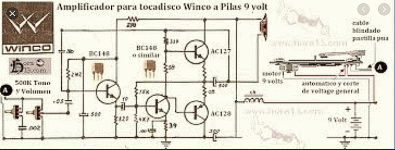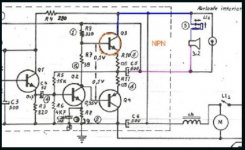Hi everyone. I got one of an old Yugoslavian record player. It is a iskra-riz traviat stereo. I know this is by no means an audiophile record player but it is a nice looking and pretty decent build quality player and i really want to fix it. Basically when I plugged it in one channel was making a loud humming like when you plug a speaker directly into the mains frequency AC so i quickly turned it off. So I pulled out an amplifier and checked it. There was nothing visible. It has a single diode and a 12v 2000uf capacitor for rectification. I measured 8.5v across the main capacitor. So I tried powering amplifier from my bench power supply. I set the voltage to 8v and current limit to 200ma and gave it an input. This time there was no humming but at first it pulled 150ma and one channel worked perfectly and then when i started to test the bad channel current started to drop and channel started making a squealing noise. I instantly powered it off. But under that squealing I could still hear a very distorted music. Can someone please help me i am now scared to do anything else. I am afraid of blowing up these vintage transistors. It has AC180 and AC181k output transistors.
I recorded a video of a pcb. Here is a link ( don't worry about disconnected main capacitor that was just me testing things...
iskra-riz traviat stereo amplifier board. - YouTube
4 pots are volume and tone control for each channel.
I recorded a video of a pcb. Here is a link ( don't worry about disconnected main capacitor that was just me testing things...
iskra-riz traviat stereo amplifier board. - YouTube
4 pots are volume and tone control for each channel.
Power up the circuitry using a much lower voltage, and increase whilst watching the current, and check the voltages across transistors for comparison, at some level of supply voltage the transistor forward conducting junction voltages will 'stabilise' on the good channel at circa 200mV (germaniums were nearly always all pnp in those days).
Helps a lot if you can sketch a schematic, and look around for a similar schematic - there aren't too many circuit variations in those days.
Helps a lot if you can sketch a schematic, and look around for a similar schematic - there aren't too many circuit variations in those days.
Last edited:
I will look around the internet for a schematic that looks close to this one. Thanks for the feedback. I will do some more research tomorrow. I hope it is not one of these germanium transistors...
Even if it is one of the germanium transistors, there is no need to worry.
There are plenty of spares around!!!
The first thing to do is try and obtain a circuit diagram.
Also please post photos of the circuit board and power supply (as big as possible)
Thanks
Andy
.
There are plenty of spares around!!!
The first thing to do is try and obtain a circuit diagram.
Also please post photos of the circuit board and power supply (as big as possible)
Thanks
Andy
.
OK today if i get a chance i will try to do my first reverse engineering since board is not too complicated. I was also thinking about trying to see if I have capacitors values and trying to replace the caps just to rule them out (i will probably recap boards anyways since electrolytes like to go dry ... And I will later post better pictures. Thanks.
If you can post photos of the board and internals, it would be a great help in diagnosing the problem.
It would also help if you could post pictures of the power supply and the arm connections.
Andy
.
It would also help if you could post pictures of the power supply and the arm connections.
Andy
.
Last edited:
Here are the photos...
IMG-20200830-112445 — ImgBB
IMG-20200830-112221-2 — ImgBB
IMG-20200830-112317-2 — ImgBB
IMG-20200830-112420-2 — ImgBB
IMG-20200830-112342-2 — ImgBB
Hope this helps.
I will try to reverse engineer the board later.
Also power supply is only on one of the boards
IMG-20200830-112445 — ImgBB
IMG-20200830-112221-2 — ImgBB
IMG-20200830-112317-2 — ImgBB
IMG-20200830-112420-2 — ImgBB
IMG-20200830-112342-2 — ImgBB
Hope this helps.
I will try to reverse engineer the board later.
Also power supply is only on one of the boards
Channel that is making all the noises is one with the power supply. I did some tests and could it really be just the capacitors because I tried it out again and slowly brought up the voltage and broken channel sounded fine but was not as loud as the other one and then it started to make noise again.
BC327\337 Ge ГТ402\ГТ404 (former USSR)Bd135\136 , Tip41c|42c, Tip31\32 Change Bias (D, R)
Check AC180 и AC181k (с-е)
Please don´t.I was also thinking about trying to see if I have capacitors values and trying to replace the caps just to rule them out (i will probably recap boards anyways since electrolytes like to go dry
Not yet.
First you troubleshoot and repair it, then you update/improve it.
If one channel works properly, power supply is not THAT bad.
Amplifier should be somewhat similar to:
Attachments
I already replaced the capacitors all except these plastic tube with foil looking type. Problem is still there one channel works the other is quite and distorted.
On my bench power supply it is not buzzing like crazy. It is just not working properly. What could be wrong with it?
One improvement is that channel that works is a bit better after replacing capacitors.
How do i start troubleshooting? I am afraid to power it on for longer time to measure stuff since it started making weird noises last time...
On my bench power supply it is not buzzing like crazy. It is just not working properly. What could be wrong with it?
One improvement is that channel that works is a bit better after replacing capacitors.
How do i start troubleshooting? I am afraid to power it on for longer time to measure stuff since it started making weird noises last time...
Can i test transistors in circuit?
Also I found out that "oscillation" happens when i go above 4v
Also I found out that "oscillation" happens when i go above 4v
Check with power off. At va.s transistors of two types NPN and PNP.
Possible malfunctions - short circuit or open circuit
Possible malfunctions - short circuit or open circuit
I will draw a diagram I just need to sit down and take some time since it is my first time reverse engineering.
- Home
- Amplifiers
- Solid State
- How do i fix vintage germanium amplifier from a record player ?

